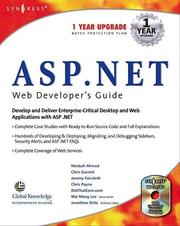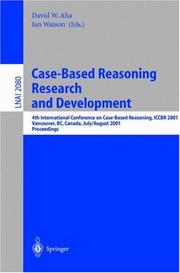| Listing 1 - 10 of 16 | << page >> |
Sort by
|
Book
ISBN: 3862194892 9783862194896 9783862194889 3862194884 Year: 2013 Publisher: Kassel : Kassel University Press,
Abstract | Keywords | Export | Availability | Bookmark
 Loading...
Loading...Choose an application
- Reference Manager
- EndNote
- RefWorks (Direct export to RefWorks)
Book
Year: 1974 Publisher: Erlangen Nürnberg [s.n.]
Abstract | Keywords | Export | Availability | Bookmark
 Loading...
Loading...Choose an application
- Reference Manager
- EndNote
- RefWorks (Direct export to RefWorks)

ISBN: 128105299X 9786611052997 0080475949 1928994512 Year: 2002 Publisher: Rockland, Mass. : Syngress Publishing, Inc.,
Abstract | Keywords | Export | Availability | Bookmark
 Loading...
Loading...Choose an application
- Reference Manager
- EndNote
- RefWorks (Direct export to RefWorks)
All the essential information needed to take full advantage of Microsoft's newest Web development platformWhat is ASP .NETASP.NET is a revolutionary new programming framework that enables the rapid development of powerful web applications and services. Part of the emerging Microsoft .NET Platform, it provides the easiest and most scalable way to build, deploy and run distributed web applications that can target any browser or device. ASP.NET (formerly referred to as ASP+) is more than the next version of Active Server Pages (ASP); it is a unified Web development platform that provi
Internet programming. --- Web servers. --- Active server pages. --- Servers, Web --- Webservers --- World Wide Web servers --- WWW servers --- ASP (Computer file) --- Client/server computing --- Cookies (Computer science) --- Web hosting --- Computer programming --- Equipment and supplies
Periodical
ISSN: 20316186 Year: 2008 Publisher: Antwerpen AHA! Media F.V.
Abstract | Keywords | Export | Availability | Bookmark
 Loading...
Loading...Choose an application
- Reference Manager
- EndNote
- RefWorks (Direct export to RefWorks)
Periodical
ISSN: 20316194 Year: 2008 Publisher: Antwerpen AHA! Media F.V.
Abstract | Keywords | Export | Availability | Bookmark
 Loading...
Loading...Choose an application
- Reference Manager
- EndNote
- RefWorks (Direct export to RefWorks)
Book
ISBN: 3319610309 3319610295 Year: 2017 Publisher: Cham : Springer International Publishing : Imprint: Springer,
Abstract | Keywords | Export | Availability | Bookmark
 Loading...
Loading...Choose an application
- Reference Manager
- EndNote
- RefWorks (Direct export to RefWorks)
This book constitutes the refereed proceedings of the 25th International Conference on Case-Based Reasoning Research and Development, ICCBR 2017, held in Trondheim, Norway, in June 2017. The 27 full papers presented together with 3 keynote presentations were carefully reviewed and selected from 38 submissions. The theme of ICCBR-2017, "Analogy for Reuse", was highlighted in several events. These papers, which are included in the proceedings, address many themes related to the theory and application of case-based reasoning, analogical reasoning, CBR and Deep Learning, CBR in the Health Sciences, Computational Analogy, and Process-Oriented CBR.
Computer science. --- Data mining. --- Information storage and retrieval. --- Artificial intelligence. --- Application software. --- Computer Science. --- Artificial Intelligence (incl. Robotics). --- Computer Applications. --- Data Mining and Knowledge Discovery. --- Information Storage and Retrieval. --- Application computer programs --- Application computer software --- Applications software --- Apps (Computer software) --- AI (Artificial intelligence) --- Artificial thinking --- Electronic brains --- Intellectronics --- Intelligence, Artificial --- Intelligent machines --- Machine intelligence --- Thinking, Artificial --- Algorithmic knowledge discovery --- Factual data analysis --- KDD (Information retrieval) --- Knowledge discovery in data --- Knowledge discovery in databases --- Mining, Data --- Informatics --- Computer software --- Bionics --- Cognitive science --- Digital computer simulation --- Electronic data processing --- Logic machines --- Machine theory --- Self-organizing systems --- Simulation methods --- Fifth generation computers --- Neural computers --- Database searching --- Science --- Information storage and retrieva. --- Artificial Intelligence. --- Information retrieval. --- Data retrieval --- Data storage --- Discovery, Information --- Information discovery --- Information storage and retrieval --- Retrieval of information --- Documentation --- Information science --- Information storage and retrieval systems --- Information storage and retrieval systems. --- Automatic data storage --- Automatic information retrieval --- Automation in documentation --- Computer-based information systems --- Data processing systems --- Data storage and retrieval systems --- Discovery systems, Information --- Information discovery systems --- Information processing systems --- Information retrieval systems --- Machine data storage and retrieval --- Mechanized information storage and retrieval systems --- Computer systems --- Electronic information resources --- Data libraries --- Digital libraries --- Information organization --- Information retrieval
Book
ISBN: 9781003802921 9781003355281 1003355285 9781003802877 1003802877 1003802923 Year: 2024 Publisher: CRC Press
Abstract | Keywords | Export | Availability | Bookmark
 Loading...
Loading...Choose an application
- Reference Manager
- EndNote
- RefWorks (Direct export to RefWorks)
"This book focuses on a subtopic of Explainable AI (XAI) called Explainable Agency (EA), which involves producing records of decisions made during an agent's reasoning, summarizing its behavior in human-accessible terms, and providing answers to questions about specific choices and the reasons for them. We distinguish explainable agency from Interpretable Machine Learning (IML), another branch of XAI that focuses on providing insight (typically, for an ML expert) concerning a learned model and its decisions. In contrast, explainable agency typically involves a broader set of AI-enabled techniques, systems, and stakeholders (e.g., end users) where the explanations provided by EA agents are best evaluated in the context of human subject studies. The chapters of this book explore the concept of endowing intelligent agents with explainable agency, which is crucial for agents to be trusted by humans in critical domains such as finance, self-driving vehicles, and military operations. This book presents the work of researchers from a variety of perspectives and describes challenges, recent research results, lessons learned from applications, and recommendations for future research directions in EA. The historical perspectives of explainable agency and the importance of interactivity in explainable systems are also discussed. Ultimately, this book aims to contribute to the successful partnership between humans and AI systems."-- Provided by publisher.
Reinforcement learning. --- Artificial intelligence. --- Decision making.
Periodical
ISSN: 16962060
Abstract | Keywords | Export | Availability | Bookmark
 Loading...
Loading...Choose an application
- Reference Manager
- EndNote
- RefWorks (Direct export to RefWorks)
History, Modern --- History, Modern. --- Modern History. --- Modern history --- World history, Modern --- World history --- 1900 - 2099 --- Latin America --- Latin America. --- Asociación Latinoamericana de Libre Comercio countries --- Neotropical region --- Neotropics --- New World tropics --- Spanish America --- History --- History of Europe --- Arts and Humanities
Periodical
ISSN: 20479980
Abstract | Keywords | Export | Availability | Bookmark
 Loading...
Loading...Choose an application
- Reference Manager
- EndNote
- RefWorks (Direct export to RefWorks)
Cardiology --- Cardiovascular system --- Cerebrovascular disease --- Heart Diseases --- Cardiology. --- Cerebrovascular disease. --- Cerebrovascular Disorders. --- Cardiovascular Diseases. --- Apoplexy --- Brain --- Cerebral circulation disorders --- Cerebral vascular accident --- Cerebrovascular accident --- Cerebrovascular disorders --- Cerebrovascular syndrome --- CVA (Disease) --- Stroke --- Neglect (Neurology) --- Cardiovascular diseases --- Heart --- Internal medicine --- Angiology --- Cardiovascular Disease Specialty --- Vascular Medicine --- Disease Specialty, Cardiovascular --- Medicine, Vascular --- Specialty, Cardiovascular Disease --- Cardiovascular Disease --- Disease, Cardiovascular --- Diseases, Cardiovascular --- Cerebrovascular Diseases --- Cerebrovascular Insufficiency --- Cerebrovascular Occlusion --- Brain Vascular Disorders --- Intracranial Vascular Disorders --- Vascular Diseases, Intracranial --- Brain Vascular Disorder --- Cerebrovascular Disease --- Cerebrovascular Disorder --- Cerebrovascular Insufficiencies --- Cerebrovascular Occlusions --- Disease, Cerebrovascular --- Diseases, Cerebrovascular --- Insufficiencies, Cerebrovascular --- Insufficiency, Cerebrovascular --- Intracranial Vascular Disease --- Intracranial Vascular Diseases --- Intracranial Vascular Disorder --- Occlusion, Cerebrovascular --- Occlusions, Cerebrovascular --- Vascular Disease, Intracranial --- Vascular Disorder, Brain --- Vascular Disorder, Intracranial --- Vascular Disorders, Brain --- Vascular Disorders, Intracranial --- Diseases --- Diseases. --- Blood-vessels --- cardiology --- cardiovascular diseases --- cerebrovascular diseases --- stroke

ISBN: 3540445935 3540423583 Year: 2001 Publisher: Berlin, Heidelberg : Springer Berlin Heidelberg : Imprint: Springer,
Abstract | Keywords | Export | Availability | Bookmark
 Loading...
Loading...Choose an application
- Reference Manager
- EndNote
- RefWorks (Direct export to RefWorks)
The 2001 International Conference on Case-Based Reasoning (ICCBR 2001, www.iccbr.org/iccbr01), the fourth in the biennial ICCBR series (1995 in Sesimbra, Portugal; 1997 in Providence, Rhode Island (USA); 1999 in Seeon, Germany), was held during 30 July – 2 August 2001 in Vancouver, Canada. ICCBR is the premier international forum for researchers and practitioners of case based reasoning (CBR). The objectives of this meeting were to nurture significant, relevant advances made in this field (both in research and application), communicate them among all attendees, inspire future advances, and continue to support the vision that CBR is a valuable process in many research disciplines, both computational and otherwise. ICCBR 2001 was the first ICCBR meeting held on the Pacific coast, and we used the setting of beautiful Vancouver as an opportunity to enhance participation from the Pacific Rim communities, which contributed 28% of the submissions. During this meeting, we were fortunate to host invited talks by Ralph Bergmann, Ken Forbus, Jaiwei Han, Ramon López de Mántaras, and Manuela Veloso. Their contributions ensured a stimulating meeting; we thank them all.
Expert systems (Computer science) --- Case-based reasoning --- Artificial intelligence --- Computer Science --- Mechanical Engineering - General --- Mechanical Engineering --- Engineering & Applied Sciences --- Case-based learning --- Computer science. --- Information technology. --- Business --- Programming languages (Electronic computers). --- Mathematical logic. --- Artificial intelligence. --- Computer Science. --- Artificial Intelligence (incl. Robotics). --- Mathematical Logic and Formal Languages. --- Programming Languages, Compilers, Interpreters. --- IT in Business. --- Data processing. --- Reasoning --- Artificial Intelligence. --- IT (Information technology) --- Technology --- Telematics --- Information superhighway --- Knowledge management --- Informatics --- Science --- AI (Artificial intelligence) --- Artificial thinking --- Electronic brains --- Intellectronics --- Intelligence, Artificial --- Intelligent machines --- Machine intelligence --- Thinking, Artificial --- Bionics --- Cognitive science --- Digital computer simulation --- Electronic data processing --- Logic machines --- Machine theory --- Self-organizing systems --- Simulation methods --- Fifth generation computers --- Neural computers --- Business—Data processing. --- Computer languages --- Computer program languages --- Computer programming languages --- Machine language --- Languages, Artificial --- Algebra of logic --- Logic, Universal --- Mathematical logic --- Symbolic and mathematical logic --- Symbolic logic --- Mathematics --- Algebra, Abstract --- Metamathematics --- Set theory --- Syllogism --- Logic, Symbolic and mathematical. --- Programming languages (Electronic computers)
| Listing 1 - 10 of 16 | << page >> |
Sort by
|

 Search
Search Feedback
Feedback About UniCat
About UniCat  Help
Help News
News